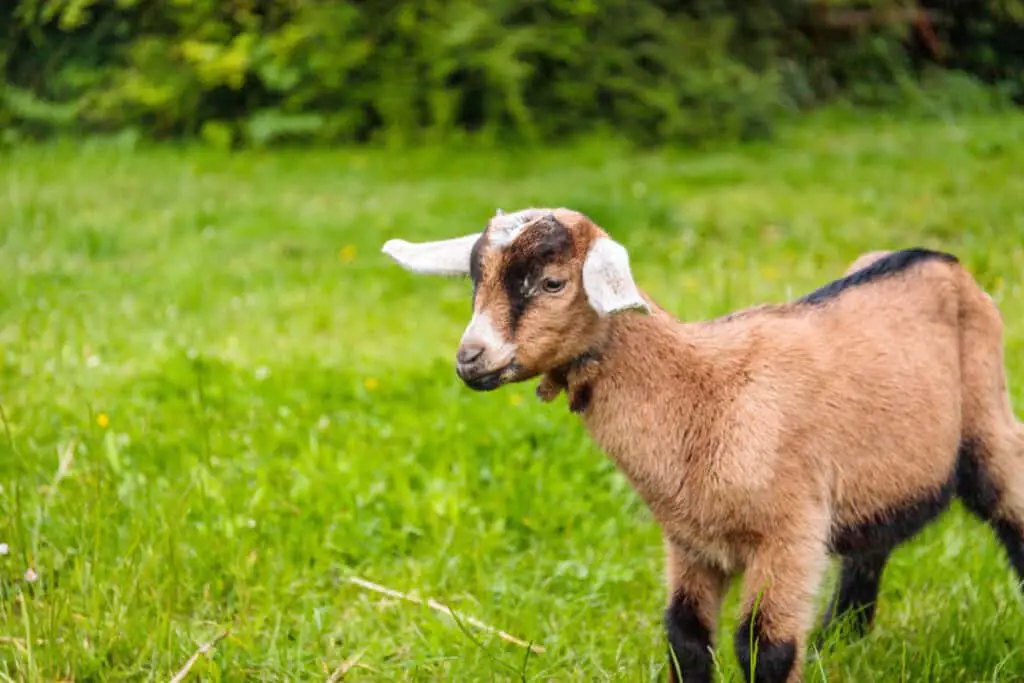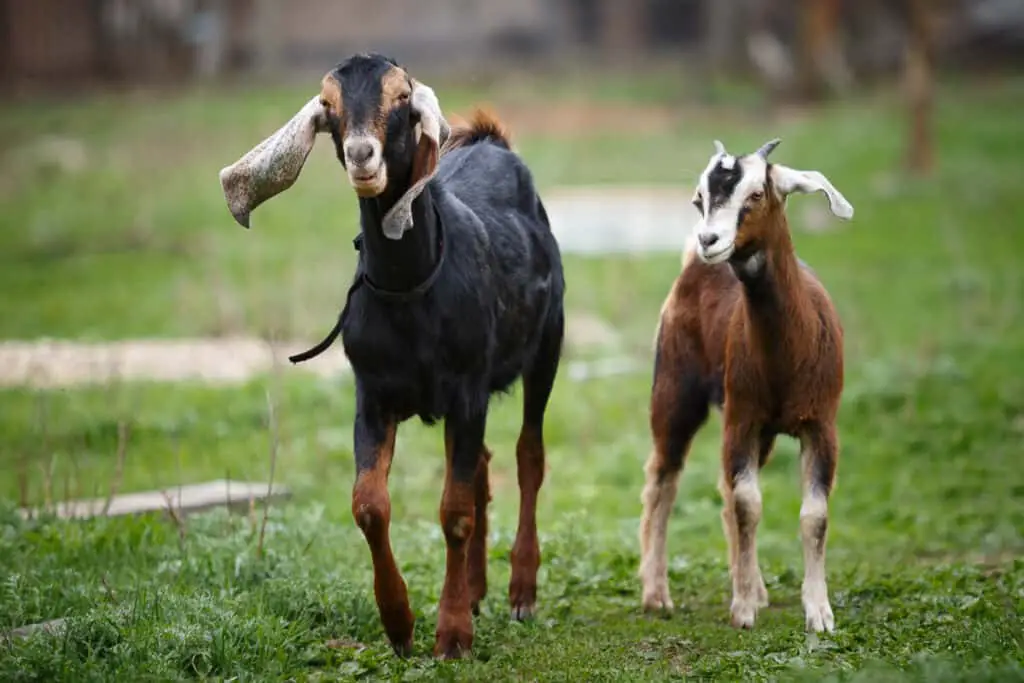The Nubian goat is a popular breed of domesticated dairy goats that originated in the African continent. It is known for its distinctive long, floppy ears, Roman nose, and rounded body shape.
The breed was first introduced to England in the early 19th century from Egypt and Sudan.
Nubian goats are highly valued not only for their milk production but also for their meat quality and ability to adapt to different climatic conditions.
They have a reputation for being quite stubborn but also intelligent animals that can be trained easily with patience and consistency.
In addition, they have a friendly personality which makes them ideal pets or show animals as well.
Overall, the Nubian goat has become one of the most sought-after breeds globally due to its unique characteristics and versatility.

Origin And History Of The Nubian Goat Breed
The Nubian goat is a breed of domesticated goats that are mainly found in the Middle East, North Africa and India. This breed has been widely used for milk production and as a source of meat.
It is believed that this breed originated from ancient Egypt, where it was highly valued for its cultural significance. Despite its popularity in ancient times, little is known about the genetic diversity of the Nubian goat breed due to limited research efforts.
However, it is commonly accepted that this breed exhibits remarkable adaptability to different climates and environments. Today, these goats can be found all over the world, including in countries such as Australia, New Zealand, Europe and North America.
The widespread distribution of this breed can be attributed to their high productivity levels and versatility in terms of usage.
Physical Characteristics And Appearance
The Nubian goat is a breed of domesticated goats that are known for their unique physical characteristics and appearance.
One of the most distinctive features of this breed is its large, pendulous ears which can measure up to 25 cm in length.
The nose of the Nubian goat is also very prominent and convex with a Roman profile. They have long legs, wide-set eyes, and a compact body.
Another notable feature of Nubian goats is their horns. Typically, these goats have two types of horns: curved or straight. The curved horn type tends to be longer and more slender while the straight horn type is shorter and thicker at the base.
In terms of coat color, Nubian goats come in a variety of shades including black, brown, white, cream, red, or even spotted patterns. Some may have solid-colored coats while others might display different markings on their bodies such as stripes or spots.
Overall, the physical characteristics and appearance of the Nubian goat make them easily distinguishable from other breeds.
From their large floppy ears to their various coat colors and horn types, they stand out among other domesticated animals within the same species.
Milk Production And Quality
In terms of breeding techniques, Nubian goats are a popular choice for farmers due to their high fertility rate and ability to breed year-round. Artificial insemination is commonly used with this breed, as it allows for the selection of superior genetics from male goats that may not be physically present on the farm.
Additionally, selective breeding has been utilized to improve desirable traits such as milk production and conformation.
Meeting nutritional requirements is crucial for maintaining healthy Nubian goats and maximizing milk production. These animals require a diet rich in protein, minerals, vitamins, and energy sources. High-quality hay should make up a significant portion of their diet, supplemented with grains or other concentrates as needed.
It’s also important to ensure access to clean water at all times and provide salt licks for necessary mineral intake.
Proper nutrition can significantly impact milk quality and quantity in Nubian goats, making it an essential aspect of successful goat farming.
Meat Quality And Adaptability To Different Climates
Meat quality is an essential factor in goat production, and Nubian goats have been preferred for their meat. They are known to produce tender, flavorful, and low-fat meat that is high in protein. These characteristics make them a popular choice among farmers who want to raise goats for meat production.
Moreover, they adapt well to different climates, which makes them suitable for raising in various regions worldwide.
Crossbreeding potential of Nubian goats has also gained attention due to the health benefits associated with it. Crossbred Nubian goats tend to be healthier than purebreds because they inherit disease resistance from both parents.
For instance, crossbreeding Nubians with Boers results in offspring that exhibit stronger immune systems against parasites and diseases prevalent in specific areas. Therefore, this practice is recommended as it increases the sustainability of goat farming while providing nutritious food sources and promoting animal welfare.
Personality And Trainability
Nubian goats are known for their excellent meat quality and adaptability to different climates. However, these goats also have unique personalities that make them stand out from other goat breeds. Nubians are generally friendly and affectionate towards humans and other animals, which makes them great pets or show animals.
Despite their friendly disposition, Nubians can sometimes be stubborn and require patience during obedience training. They have a strong will and may resist commands if they feel uncomfortable in certain situations. However, with proper training techniques like positive reinforcement, Nubians can learn quickly and become obedient companions.
It is important to note that each goat has its own personality, so it is crucial to understand individual temperament when training a Nubian goat. In terms of trainability, Nubian goats respond well to consistency in both behavior and routine. These intelligent goats enjoy activities such as going on walks or participating in agility courses.
Additionally, socialization with humans at an early age can help develop trust between the animal and owner leading to better obedience later on in life. Understanding the unique temperaments of Nubian goats is essential for successful obedience training without compromising their natural instincts as loving family members or productive farm animals.
Uses And Popularity Of The Nubian Goat Breed
The Nubian goat breed is a highly versatile and popular breed that has gained significant popularity across the world. The breed’s unique physical characteristics, including their long, floppy ears and roman nose, make them easily identifiable. They are known for their friendly temperament and excellent milk production capabilities, which makes them an ideal choice for both commercial and domestic settings.
One of the reasons behind the breed’s increasing popularity can be traced to its breeding practices. Breeders have focused on developing traits such as high milk yield, fast growth rate, and disease resistance through selective breeding. This has led to a more robust breed that performs well in different environmental conditions. Additionally, the nutritional requirements of the Nubian goat are relatively low compared to other breeds, making them easy to maintain on small farms or homesteads.
Nutritional Requirements:
- Require adequate roughage in their diet
- Need fresh water available at all times
- Benefit from protein-rich feed supplements
Commercial Uses:
- Ideal for dairy farming due to their high milk yields
- Used as meat goats due to high-quality carcass characteristics
- Popular in petting zoos and animal shows
Domestic Uses:
- Perfect for small-scale backyard farming
- Great family pets due to their docile nature
- Can provide natural weed control on pastures
- Can be used for their milk, which is high in butterfat and can be used for making cheese, yogurt, and other dairy products.

Conclusion
Originating from Nubia, a region along the Nile river in northern Africa, the Nubian goat is one of the oldest and most popular breeds worldwide. With its distinctive long floppy ears and Roman nose, this breed has been selectively bred for milk production as well as meat quality. It possesses unique characteristics such as adaptability to different climates and hardiness making it an ideal choice for small-scale farmers.
The Nubian goat’s milk is high in butterfat content which makes it suitable for cheese and yogurt processing. Its sweet taste also adds value to its demand among consumers.
In addition to milk production, the breed’s adaptability to harsh environments make it possible to use them for meat production. Their docile nature allows easy handling making them excellent pets while their trainability enables them to participate in shows or exhibitions.
In conclusion, with its versatility and popularity around the world, the Nubian goat is indeed a ‘jack-of-all-trades’ when it comes to livestock farming. From producing high-quality milk products to providing nutritious meat options, this breed proves itself adaptable and valuable on any farm setting.

